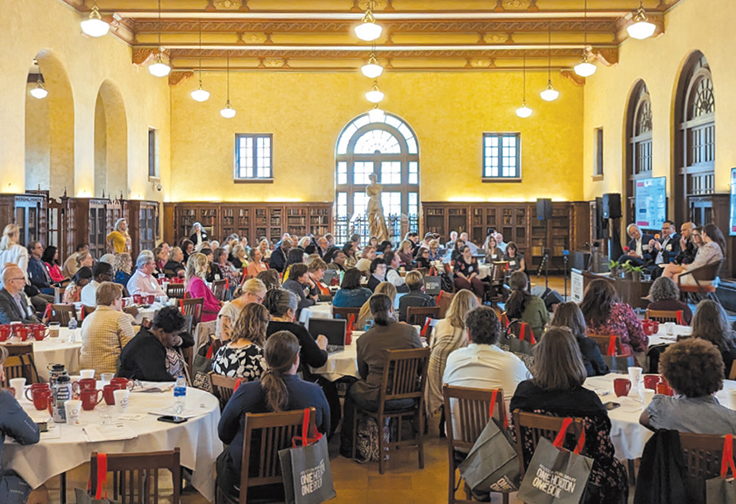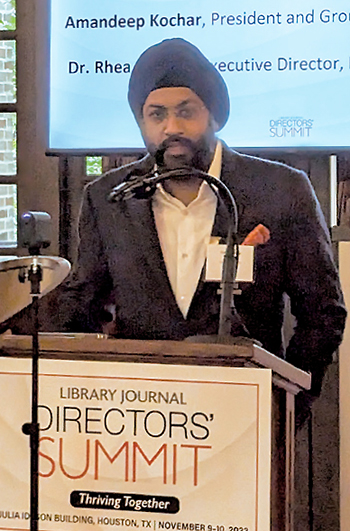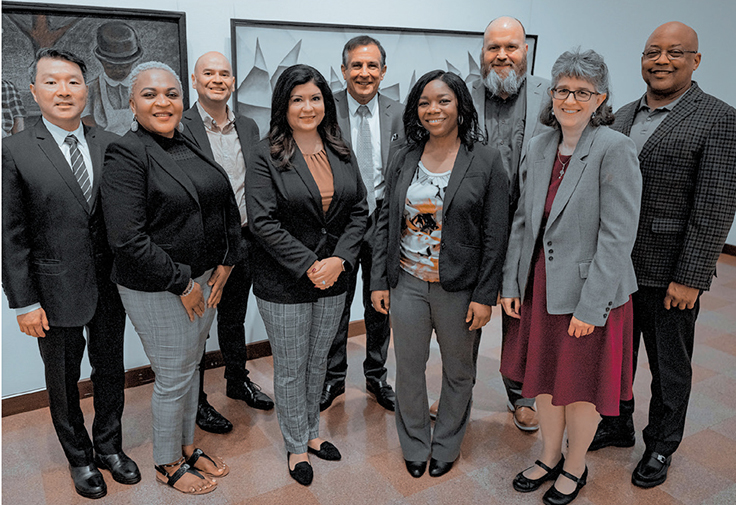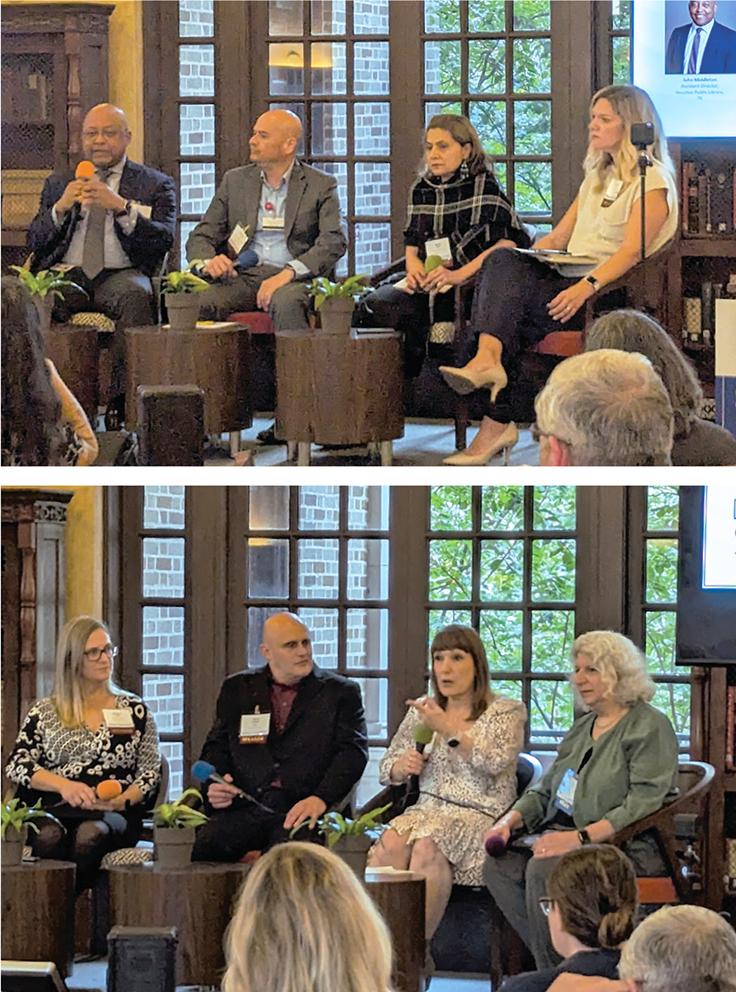Building On Momentum | LJ's 2023 Directors' Summit
How do library leaders find the support needed to steward their organizations through challenging times? LJ's 2023 Directors' Summit asked—and answered—some big questions.
How do library leaders find the support needed to steward their organizations through challenging times?
LJ editors and event planners had an advantage in planning the 2023 Directors’ Summit and the Safety and Security Pre-Conference that preceded it: two highly successful prior events to build on. The 2022 Directors’ Summit, held at Baltimore’s Enoch Pratt Free Library, and the Public Library Safety Summit, which took place in April 2023 at Columbus Metropolitan Library, OH, clearly resonated with those who attended. After years of pandemic-driven disconnection, people wanted to talk and listen—and did.
The 2022 Directors’ Summit focused on how leaders could support a resilient workforce in the face of multiple stresses that included COVID, book banning attempts, and personal attacks on staff. The next question was where—and how—did directors find the support they needed? The 2023 Summit, held at Houston Public Library’s Julia Ideson Building November 9–10, explored those questions from several angles.
 |
ALL IN An engaged group of library leaders gathered in Houston PL’s historic Julia Ideson Building. Photo by Tracey Fenton |
CONTINUING THE SAFETY CONVERSATION
Prior to the Directors’ Summit, select leaders convened for a Safety Pre-Con to address a host of issues that have intensified over the past six months. From increasing actions from far-right groups such as Moms for Liberty to several states breaking ties with the American Library Association (ALA) to a summer wave of bomb threats to libraries, safety remains front and center for library leaders.
Previous Safety Summit participants have instituted changes both large and small, they noted, from color-coding incident reports to help eliminate ambiguity to changing the language used within the library—suspending patrons rather than banning them, replacing the word security with safety. Most important, everyone agreed: Listen to staff’s concerns, because they know what’s happening on a minute-by-minute basis, and respect their comfort levels.
 |
WARM WELCOME Amandeep Kochar, President/Group CEO of platinum sponsor Baker & Taylor, greeted attendees. Photo by Tracey Fenton |
An emphasis on relationships, empathy, and compassion makes a notable difference. Restorative justice, an approach to addressing harm and conflict that focuses on healing, repairing relationships, and promoting accountability, can be a valuable a tool for safety; having a social worker on staff can enable a focus on getting people what they need and reduce punitive interactions. And—a constant thread throughout the day—frontline staff should always be given ample tools and training to help them feel safe.
When an emergency does occur, participants agreed that prioritizing communication with staff and being up front about the decisions made—which includes acknowledging mistakes—is essential. While a Continuation of Operations Plan provides a framework for action in an emergency, panelists advised that what administrators say and what staff hear can be very different in a time of crisis; focus on clarity and authenticity. Safety is a balancing act, reiterated a panel of HPL’s Safety, Security, and Wellness taskforce members. Be flexible, set security goals up to be sustainable, and, as always, empower staff.
MEETING CHALLENGES
While the themes explored during the Directors’ Summit ranged widely, the emphasis on connection and speaking up carried forward from the safety discussions. The onslaught of book challenges and adverse legislation emerging over the past few years drove much of the conversation. The opening panel, on building political capital to advance library objectives, looked at engagement strategies and the intentionality that has become ever more necessary. “When I became a legislator, I didn’t know librarians were about to become the subversive resistance leaders of the nation,” said Arkansas State Representative Ashley Hudson (D-Little Rock).
Library leaders need to establish relationships with policymakers well in advance of any policy conflicts. Be part of the conversation from the beginning, and make sure the library’s brand is recognizable. Get elected officials into the library, and when you need to go to the state capitol, speak up and be bold—you’re the expert on what’s happening in your library. Having those conversations, even when they’re difficult, also models advocacy for staff.
In a later session, panelists shared their experiences with proactive advocacy and legal battles over censorship legislation. No matter where those conflicts are playing out, librarians need to begin by paying attention to messaging and framing, both how they can communicate effectively and forcefully, and understanding how the opposition changes its strategy.
Whatever the message, productive engagement begins with strong alliances. Book bans are part of a large, coordinated effort whose broader strategy is to erode trust in public institutions and damage public education, and libraries need to connect with advocates at a local level. Different types of libraries can also help one another: A public librarian can speak up for a school librarian under threat, or academic librarians for their public counterparts.
CRISIS COMMUNICATION
Knowing how you want to tell your story is critical as well. A deep dive on crisis communication began with the ground rule: Be proactive about providing information before someone else provides it for you. This means preparing narratives as
far in advance as possible—consider your talking points, which questions to answer, what language you do and don’t want to use. LaDonna Weems, HPL deputy assistant director of communications, identified three types of crises: immediate, emerging, and ongoing. Consider which one you’re addressing and take your time.
Remember to include staff in the information cycle—they’re going through the crisis as well, and they will be talking to their family and neighbors about it, so consider them a second line of communications. Make sure that employees know where to direct media representatives who approach them for comments.
If a journalist sends you five questions, pointed out Mary Benton, director of communications for the Mayor’s office, city of Houston, you don’t have to answer each one. “I tell reporters, we have provided you with a response—it may not be the one you’re looking for, but we did.”
AI: THREAT OR OPPORTUNITY?
In his keynote speech, Dr. R. David Lankes, the Virginia & Charles Bowden Professor of Librarianship at the University of Texas at Austin’s School of Information, used the lens of narrative to consider another current concern: artificial intelligence (AI). Book banning rhetoric has put librarians on the defensive, but libraries still have a mandate to support literacy and the workforce.
 |
WEIGHING IN Top: The panel Supporting Staff and Nurturing Resilient Organizations featured (l.-r.) Sara Slymon, Executive Director, Thomas Crane PL, MA; Courtney Stevens, Executive Director, Warren County PL, KY; and Stephen Jackson, Director of Equity and Anti-racism, Oak Park PL, IL. Bottom: A panel on tackling censorship sparked lively conversation from a group of Executive Directors (l.-r.): Virginia Library Association’s Lisa Varga, Freedom to Learn Advocates’ Rory Steele, Austin PL’s Roosevelt Weeks, and Central Arkansas Library System’s Nate Coulter. Photos courtesy of Houston Public Library |
By 2025, he noted, 85 million jobs around the world will have been replaced by AI. But within that timeframe AI also has the potential to generate 97 million new, different roles—it already drives music algorithms, fitness apps, and insurance data, to name a few. How can libraries prepare their communities for new career opportunities?
Lankes also pointed out that education is a major driver of current mortality rates in the United States. Adults without a four-year degree have a significantly shorter lifespan— sometimes described as “deaths of despair,” which have been tied to social isolation. The work of education and empowerment can go hand in hand with addressing un- and underemployment, he noted, but we need to create an AI system that doesn’t encourage disconnection—this is the challenge libraries face, and one that they urgently need to meet.
 |
THE A TEAM Keeping the wheels turning at Houston PL (l.-r.): Chief Technology Officer Dominic Tong, Chief Finance Officer Hope Obika, Assistant Director of Customer Experience Roberto Zapata, Deputy Assistant Director of Systemwide Programs Ophelia Gomes, Chief Operating Officer Ricardo Peralez, Deputy Assistant Director of Communications LaDonna Weems, Deputy Assistant Director of Library Materials Patrick Atkins, Manager of Business Intelligence Laurie Covington, and Assistant Director of Spaces John Middleton. Photo courtesy of Houston Public Library |
OXYGEN MASKS
In the face of these ongoing challenges, giving library staff what they need can be a balancing act. How do leaders offer guidance, advice, safety, and encouragement while putting on their own proverbial oxygen masks first? Bridging the disconnect between younger staff and Gen-X managers who came of age with a “work ‘til you drop” ethos, for example, calls for managing expectations on both sides and clearly defining consequences at the same time. But that well requires replenishment on a regular basis.
As with advocacy, connection is key. Without the option to vent in the break room to peers, directors need to cultivate strong networks, whether through consortia, listservs, associations, or, as attendees were encouraged to do, exchanging contact information.
 |
SAFETY FIRST The Safety and Security Pre-Con revisited themes discussed at LJ's April 2023 Safety Summit. Top: A panel examining the Balancing Act of Safety featured (l.-r.) Houston PL's Middleton; Assistant Director of Customer Experience Roberto Zapata; Chief of Central Library Saima Kadir; and moderator Angela Craig, Director of Charleston County Public Library, SC. Bottom: The panel Where We Started and Where We're Going included directors Bridget Quinn, Hartford PL, CT; David Seckman, Jeffersonville Township PL, IN; Mary Jo Giudice, Dallas PL; and moderator LJ Executive Director Lisa Peet. Top photo courtesy of Houston Public Library; bottom photo by Tracey Fenton |
It benefits the entire organization when leaders model healthy behaviors: Check-ins with peers and colleagues both inside and out of the profession, turning off work email at home, and making sure that staff are empowered to step in and help where needed.
Professional development and events can recharge as well—everyone at the Directors’ Summit is participating in a form of self-care, several panelists noted, plus strengthening bonds and surfacing ideas to bring back to their libraries.
The challenges for libraries, and library leadership, are ongoing—and are not going to abate anytime soon. But attendees left the Summit with the inspiration, determination, and connections necessary to continue the work. “The good news is that our army is bigger,” said Freedom to Learn Advocates Executive Director Rory Steele. “It will take effort, but it’s a noble cause and something we’re set up to do well.”
RELATED
ALREADY A SUBSCRIBER? LOG IN
We are currently offering this content for free. Sign up now to activate your personal profile, where you can save articles for future viewing









Add Comment :-
Comment Policy:
Comment should not be empty !!!